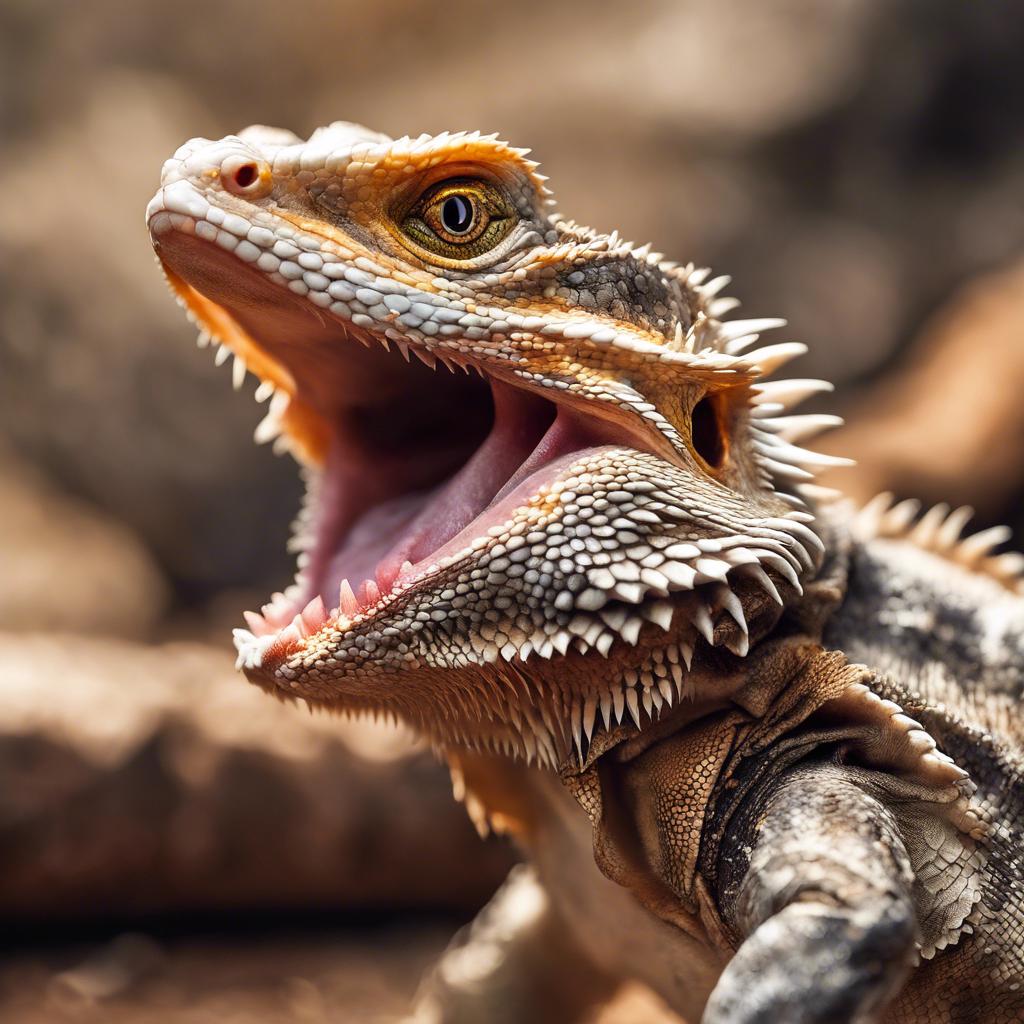Bearded dragons are fascinating reptiles that have become popular pets in recent years. These unique creatures have their own set of behaviors and health needs that owners must understand in order to ensure their well-being. Understanding bearded dragon behavior is crucial for providing them with a suitable environment and detecting any signs of illness or distress. In this article, we will explore the various aspects of bearded dragon behavior and health, including the reasons for open mouths, normal vs. abnormal mouth openings, associated health issues, prevention tips, signs of illness, dos and don'ts of bearded dragon care, when to consult a vet, and the importance of maintaining a healthy bearded dragon.
Key Takeaways
- Bearded dragons are popular pets that require proper care and attention.
- Open mouth behavior in bearded dragons can be normal or abnormal, and may indicate health issues.
- Health issues associated with open mouths in bearded dragons include respiratory infections and dehydration.
- Preventative measures for open mouth behavior in bearded dragons include proper temperature and humidity levels, and a balanced diet.
- Signs of illness in bearded dragons include lethargy, loss of appetite, and abnormal behavior, and should be addressed promptly by a veterinarian.
Understanding Bearded Dragon Behavior
To properly care for a bearded dragon, it is important to understand their natural behavior. In the wild, bearded dragons are native to the arid regions of Australia. They are diurnal creatures, meaning they are active during the day and sleep at night. Bearded dragons are known for their unique body language, which includes head bobbing, arm waving, and puffing out their beard. These behaviors are used for communication and territorial displays.
In captivity, bearded dragons may exhibit similar behaviors but may also adapt to their environment. They may become more accustomed to human interaction and may display different behaviors depending on their individual personalities. It is important for owners to observe their bearded dragons regularly to become familiar with their normal behavior patterns. This will help them detect any changes that may indicate illness or stress.
Reasons for Open Mouths in Bearded Dragons
One behavior that owners often notice in bearded dragons is open mouths. There can be several reasons why a bearded dragon may open its mouth. One common reason is thermoregulation. Bearded dragons regulate their body temperature by basking under a heat source, such as a heat lamp or UVB light. Opening their mouths allows them to release excess heat and cool down.
Another reason for open mouths in bearded dragons is stress or aggression. If a bearded dragon feels threatened or is in a confrontational situation, it may open its mouth as a warning sign. This behavior is often accompanied by other defensive postures, such as puffing out the beard or flattening the body.
Normal vs. Abnormal Mouth Openings in Bearded Dragons
While open mouths can be a normal behavior in bearded dragons, there are instances where it may indicate health issues. A normal mouth opening in a bearded dragon is usually brief and accompanied by other normal behaviors, such as basking or exploring its environment. The mouth should close naturally after a short period of time.
Abnormal mouth openings, on the other hand, may indicate health problems. If a bearded dragon's mouth remains open for an extended period of time or if it is accompanied by other abnormal behaviors, such as lethargy or loss of appetite, it may be a sign of respiratory infection or other health issues. It is important to monitor the frequency and duration of open mouths in bearded dragons to determine if there is cause for concern.
Health Issues Associated with Open Mouths in Bearded Dragons
Open mouths in bearded dragons can be associated with various health issues. One common health problem is respiratory infection. Bearded dragons are susceptible to respiratory infections, which can be caused by bacteria, viruses, or fungi. Symptoms of respiratory infection include open-mouth breathing, wheezing, coughing, and mucus discharge from the nose or mouth.
Another health issue that may cause open mouths in bearded dragons is mouth rot. Mouth rot, also known as stomatitis, is an infection of the mouth and gums. It can be caused by poor oral hygiene, injuries to the mouth, or bacterial or fungal infections. Symptoms of mouth rot include swollen or bleeding gums, bad breath, and difficulty eating.
How to Prevent Mouth Openings in Bearded Dragons

To prevent excessive mouth openings in bearded dragons, it is important to provide them with a suitable environment and diet. Bearded dragons require a warm and dry habitat with proper lighting and heating. They also need a balanced diet consisting of insects, vegetables, and fruits. Providing a clean and spacious enclosure with hiding spots and climbing structures will help reduce stress and promote overall well-being.
Maintaining proper hygiene is also crucial for preventing health issues in bearded dragons. Regularly clean their enclosure, including the substrate, water dish, and any decorations. Bearded dragons should also have access to fresh water at all times. Additionally, it is important to handle bearded dragons gently and avoid any rough or stressful interactions.
Signs of Illness in Bearded Dragons
In addition to open mouths, there are several other signs of illness that owners should be aware of. These include lethargy, loss of appetite, weight loss, diarrhea or abnormal stool, abnormal shedding, swollen limbs or joints, abnormal behavior or posture, and changes in skin color or texture. If any of these signs are observed, it is important to seek veterinary care as soon as possible.
Bearded Dragon Care: Dos and Don'ts
To ensure the health and well-being of bearded dragons, there are certain dos and don'ts that owners should follow. Some dos include providing a suitable habitat with proper lighting and heating, offering a balanced diet consisting of insects, vegetables, and fruits, providing fresh water at all times, handling them gently and avoiding stressful interactions, maintaining proper hygiene by regularly cleaning their enclosure and accessories, and observing their behavior regularly to detect any changes.
Some don'ts include feeding them inappropriate foods such as insects that are too large or toxic plants, exposing them to extreme temperatures or drafts, overcrowding their enclosure, using harsh cleaning chemicals, and neglecting their veterinary care needs.
When to Consult a Vet for Bearded Dragon Health Concerns
It is important to consult a veterinarian who specializes in reptiles if any health concerns arise with a bearded dragon. A reptile-experienced vet will have the knowledge and experience to properly diagnose and treat any health issues. It is recommended to find a vet before any problems occur so that you are prepared in case of an emergency. Regular check-ups are also important to ensure the overall health of your bearded dragon.
Maintaining a Healthy Bearded Dragon
In conclusion, understanding bearded dragon behavior and health is crucial for providing them with proper care and ensuring their well-being. By observing their behavior regularly, owners can detect any changes that may indicate illness or stress. Open mouths in bearded dragons can be a normal behavior or a sign of health issues, so it is important to monitor the frequency and duration of open mouths. By providing a suitable environment, a balanced diet, and regular veterinary care, owners can prevent health issues and maintain a healthy and happy bearded dragon.
If you're concerned about your bearded dragon's health and have noticed that it died with its mouth open, it's important to understand the potential causes and implications. In a recent article on Reptile Wizard's blog, they explore this topic in detail and provide insights into why bearded dragons may die with their mouths open. Understanding the reasons behind this behavior can help you take appropriate measures to ensure the well-being of your beloved pet. To read more about this issue, check out the article on Reptile Wizard's website: Can Bearded Dragons Die with Mouth Open?
FAQs
What is a bearded dragon?
A bearded dragon is a type of lizard that is native to Australia. They are popular pets due to their docile nature and ease of care.
Why do bearded dragons open their mouths?
Bearded dragons may open their mouths to regulate their body temperature, as they do not have sweat glands. This behavior is known as “gaping” and is a normal part of their thermoregulation process.
Do bearded dragons die with their mouths open?
It is possible for a bearded dragon to die with its mouth open, but this is not always the case. A bearded dragon may die with its mouth open if it is experiencing respiratory distress or if it has passed away due to other health issues.
What are some signs of respiratory distress in bearded dragons?
Signs of respiratory distress in bearded dragons may include open-mouth breathing, wheezing, coughing, and lethargy. If you notice any of these symptoms, it is important to seek veterinary care for your pet.
How can I prevent respiratory issues in my bearded dragon?
To prevent respiratory issues in your bearded dragon, it is important to maintain proper temperature and humidity levels in their enclosure. You should also provide a clean and well-ventilated living space, and avoid exposing your pet to cigarette smoke or other irritants. Regular veterinary check-ups can also help to catch any potential health issues early on.

